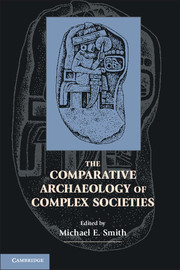Book contents
- Frontmatter
- Contents
- Tables
- Figures
- Contributors
- Foreword
- Preface
- Chapter 1 Comparative Archaeology
- Chapter 2 Approaches to Comparative Analysis in Archaeology
- Chapter 3 Comparative Frames for the Diachronic Analysis of Complex Societies
- Chapter 4 What It Takes to Get Complex
- Chapter 5 Challenges for Comparative Study of Early Complex Societies
- Chapter 6 Patterned Variation in Regional Trajectories of Community Growth
- Chapter 7 The Genesis of Monuments in Island Societies
- Chapter 8 Power and Legitimation
- Chapter 9 The Strategies of Provincials in Empires
- Chapter 10 Household Economies under the Aztec and Inka Empires
- Chapter 11 Low-Density, Agrarian-Based Urbanism
- Chapter 12 Archaeology, Early Complex Societies, and Comparative Social Science History
- Index
- References
Chapter 12 - Archaeology, Early Complex Societies, and Comparative Social Science History
Published online by Cambridge University Press: 07 October 2011
- Frontmatter
- Contents
- Tables
- Figures
- Contributors
- Foreword
- Preface
- Chapter 1 Comparative Archaeology
- Chapter 2 Approaches to Comparative Analysis in Archaeology
- Chapter 3 Comparative Frames for the Diachronic Analysis of Complex Societies
- Chapter 4 What It Takes to Get Complex
- Chapter 5 Challenges for Comparative Study of Early Complex Societies
- Chapter 6 Patterned Variation in Regional Trajectories of Community Growth
- Chapter 7 The Genesis of Monuments in Island Societies
- Chapter 8 Power and Legitimation
- Chapter 9 The Strategies of Provincials in Empires
- Chapter 10 Household Economies under the Aztec and Inka Empires
- Chapter 11 Low-Density, Agrarian-Based Urbanism
- Chapter 12 Archaeology, Early Complex Societies, and Comparative Social Science History
- Index
- References
Summary
The chapters in this volume focus on what may appear to be a narrow domain: comparative studies of early complex societies using archaeological data. But this topic is a crucial part of a broad and far-reaching theme in the human sciences. Many institutions of modern society were largely created by the Urban Revolution; that is, by the transformations of farming villages into agrarian states many millennia ago. Chronologically myopic scholars who think that Medieval Europe constituted the deep, dark, and ancient past of modern society may disagree with this claim, but anthropologists and historians who examine the broad sweep of human history will recognize its value. For when we consider that 99 percent of human history was taken up by small hunting bands and tribal farming villages, the Urban Revolution emerges as the single most momentous social transition on the road to the modern era of states, empires, and global processes (M. E. Smith 2009).
Research on the origins of early complex societies – chiefdoms and states – has long been a staple of fieldwork and comparative analysis within anthropological archaeology (e.g., Adams 1966; Childe 1950; Liu 2009; Wright 1977). Nevertheless, the results of this research have had relatively little impact on thinking in comparative history and the social sciences outside of archaeology and anthropology. Indeed, some economists and political scientists, recognizing the importance of the Urban Revolution for human history, have felt free to construct theoretical models of the process unencumbered by empirical data (e.g., Barzel 2002). Not surprisingly, these models tend to be at odds with the archaeological and historical data on early chiefdoms and states.
- Type
- Chapter
- Information
- The Comparative Archaeology of Complex Societies , pp. 321 - 330Publisher: Cambridge University PressPrint publication year: 2011
References
- 1
- Cited by

